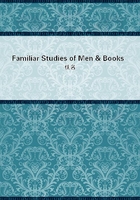
第21章
Meantime, early in the winter, and only once, we find him regretting Jean in his correspondence. "Because" - such is his reason - "because he does not think he will ever meet so delicious an armful again;" and then, after a brief excursion into verse, he goes straight on to describe a new episode in the voyage of discovery with the daughter of a Lothian farmer for a heroine. I must ask the reader to follow all these references to his future wife; they are essential to the comprehension of Burns's character and fate. In June, we find him back at Mauchline, a famous man. There, the Armour family greeted him with a "mean, servile compliance," which increased his former disgust. Jean was not less compliant; a second time the poor girl submitted to the fascination of the man whom she did not love, and whom she had so cruelly insulted little more than a year ago; and, though Burns took advantage of her weakness, it was in the ugliest and most cynical spirit, and with a heart absolutely indifferent judge of this by a letter written some twenty days after his return - a letter to my mind among the most degrading in the whole collection - a letter which seems to have been inspired by a boastful, libertine bagman. "I am afraid," it goes, "I have almost ruined one source, the principal one, indeed, of my former happiness - the eternal propensity I always had to fall in love. My heart no more glows with feverish rapture;
I have no paradisiacal evening interviews." Even the process of "battering" has failed him, you perceive. Still he had some one in his eye - a lady, if you please, with a fine figure and elegant manners, and who had "seen the politest quarters in Europe." "I frequently visited her," he writes, "and after passing regularly the intermediate degrees between the distant formal bow and the familiar grasp round the waist, I ventured, in my careless way, to talk of friendship in rather ambiguous terms; and after her return to - , I wrote her in the same terms. Miss, construing my remarks further than even I intended, flew off in a tangent of female dignity and reserve, like a mounting lark in an April morning; and wrote me an answer which measured out very completely what an immense way I had to travel before I could reach the climate of her favours. But I am an old hawk at the sport, and wrote her such a cool, deliberate, prudent reply, as brought my bird from her aerial towerings, pop, down to my foot, like Corporal Trim's hat." I avow a carnal longing, after this transcription, to buffet the Old Hawk about the ears. There is little question that to this lady he must have repeated his addresses, and that he was by her (Miss Chalmers) eventually, though not at all unkindly, rejected. One more detail to characterise the period. Six months after the date of this letter, Burns, back in Edinburgh, is served with a writ IN MEDITATIONE FUGAE, on behalf of some Edinburgh fair one, probably of humble rank, who declared an intention of adding to his family.
About the beginning of December (1787), a new period opens in the story of the poet's random affections. He met at a tea party one Mrs. Agnes M'Lehose, a married woman of about his own age, who, with her two children, had been deserted by an unworthy husband. She had wit, could use her pen, and had read WERTHER with attention. Sociable, and even somewhat frisky, there was a good, sound, human kernel in the woman; a warmth of love, strong dogmatic religious feeling, and a considerable, but not authoritative, sense of the proprieties. Of what biographers refer to daintily as "her somewhat voluptuous style of beauty," judging from the silhouette in Mr. Scott Douglas's invaluable edition, the reader will be fastidious if he does not approve. Take her for all in all, I believe she was the best woman Burns encountered. The pair took a fancy for each other on the spot; Mrs. M'Lehose, in her turn, invited him to tea; but the poet, in his character of the Old Hawk, preferred a TETE-A-TETE, excused himself at the last moment, and offered a visit instead. An accident confined him to his room for nearly a month, and this led to the famous Clarinda and Sylvander correspondence. It was begun in simple sport; they are already at their fifth or sixth exchange, when Clarinda writes: "It is really curious so much FUN passing between two persons who saw each other only ONCE;" but it is hardly safe for a man and woman in the flower of their years to write almost daily, and sometimes in terms too ambiguous, sometimes in terms too plain, and generally in terms too warm, for mere acquaintance. The exercise partakes a little of the nature of battering, and danger may be apprehended when next they meet. It is difficult to give any account of this remarkable correspondence; it is too far away from us, and perhaps, not yet far enough, in point of time and manner; the imagination is baffled by these stilted literary utterances, warming, in bravura passages, into downright truculent nonsense.
Clarinda has one famous sentence in which she bids Sylvander connect the thought of his mistress with the changing phases of the year; it was enthusiastically admired by the swain, but on the modern mind produces mild amazement and alarm.